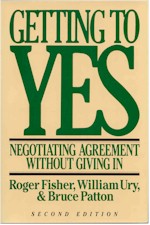 |
|
|
| ||||||
|
|
This page is the original source of this review, though you may also find it on Amazon or other sites. | ||
| Book Reviews Home | Free Audio Books | |
 |
Book Review of: Getting to Yes, 2nd EditionNegotiating Agreement Without Giving In Price:
$14.99 Availability: Usually ships
within 24 hours |
| Review
of
Getting to Yes, 2nd Edition, by Roger Fisher, William Ury, and Bruce
Patton (Hardcover, 1992) (You can print this review in landscape mode, if you want a hardcopy) Reviewer: Mark Lamendola, author of over 6,000 articles. Reviewing a book 15 years after its publication might seem a bit pointless. But that depends on the book. In this case, we're talking about a book that has near cult status in the business community. Over the past 15 years, this book has been referred to and revered in thousands--if not millions--of articles, seminars, college course, and training programs. In fact, as of the date of this review over 100 published books cite Getting to Yes. If you're in business and haven't read this book, you are operating with less than full power. But the book has value well beyond the business world. If you've ever had a disagreement end in a way that left you or the other party feeling cheated or manipulated, that ending probably came about because you were either bargaining about position or confusing the people with the problem. Either strategy guarantees at least one loser. Unfortunately, most disagreements follow one or both of these losing strategies. With discipline and practice, you can apply the knowledge in this book so that you:
The strategies have nothing to do with tricking other people or playing games. The strategies have everything to do with respecting other people and refusing to play games. In the publishing world, "thud factor" is a major consideration. Many readers expect filler, in the form of anecdotes and stories (as if they want the author to assume they are too daft to understand assertions made directly in plain English). Getting to Yes is 200 pages long, with the last 50 pages or so being basically a review and a "Cliff Notes" of the first 150. So, you have the book followed by a summary of the book. What you don't have is 150 pages stretched to 300 pages with stories that a busy executive would rather skip. The concise writing is a huge plus to many people, but some reviewers see it as a minus. So, you may also read reviews saying that other books are "better" because they are thicker. I have two proposed solutions to that:
The authors wrote this book not to entertain, but to educate. It gets to the point. There is no obfuscation, meandering, or distraction. That same communication style is required in a negotiation. The occasional anecdote may be helpful, but to lead a negotiation to a successful conclusion you must focus on the real issues. That is what this book does. And that's why it's a classic in the classroom and in the boardroom, and in executive suites and staterooms throughout the world. Be sure to read Getting Past No, The Power of a Positive No, and Negotiation Genius, as well. | |
About these reviewsYou may be wondering why the reviews here are any different from the hundreds of "reviews" posted online. Notice the quotation marks? I've been reviewing books for sites like Amazon for many years now, and it dismays me that Amazon found it necessary to post a minimum word count for reviews. It further dismays me that it's only 20 words. If that's all you have to say about a book, why bother? And why waste everyone else's time with such drivel? As a reader of such reviews, I feel like I am being told that I do not matter. The flippancy of people who write these terse "reviews" is insulting to the authors also, I would suspect. This sound bite blathering taking the place of any actual communication is increasingly a problem in our mindless, blog-posting Webosphere. Sadly, Google rewards such pointlessness as "content" so we just get more if this inanity. My reviews, contrary to current (non) standards, actually tell you about the book. I always got an "A" on a book review I did as a kid (that's how I remember it anyhow, and it's my story so I'm sticking to it). A book review contains certain elements and has a logical structure. It informs the reader about the book. A book review may also tell the reader whether the reviewer liked it, but revealing a reviewer's personal taste is not necessary for an informative book review. About your reviewer
About reading styleNo, I do not "speed read" through these. That said, I do read at a fast rate. But, in contrast to speed reading, I read everything when I read a book for review. Speed reading is a specialized type of reading that requires skipping text as you go. Using this technique, I've been able to consistently "max out" a speed reading machine at 2080 words per minute with 80% comprehension. This method is great if you are out to show how fast you can read. But I didn't use it in graduate school and I don't use it now. I think it takes the joy out of reading, and that pleasure is a big part of why I read. |
| |||||